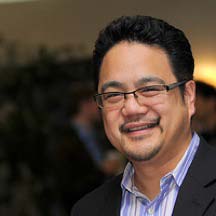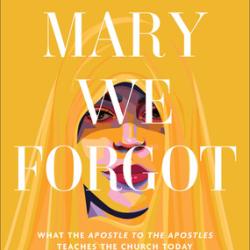By Deborah Arca Mooney
 Just weeks ago, the Rev. Bruce Reyes-Chow preached his last official sermon as Moderator of the Presbyterian Church (USA) at the denomination's bi-annual gathering, General Assembly. The youngest moderator ever to be elected, at age 39, Reyes-Chow has spent the past two years serving as the highest officer of the 2.3 million member denomination, as well as continuing to serve the church he founded in San Francisco, Mission Bay Community Church.
Just weeks ago, the Rev. Bruce Reyes-Chow preached his last official sermon as Moderator of the Presbyterian Church (USA) at the denomination's bi-annual gathering, General Assembly. The youngest moderator ever to be elected, at age 39, Reyes-Chow has spent the past two years serving as the highest officer of the 2.3 million member denomination, as well as continuing to serve the church he founded in San Francisco, Mission Bay Community Church.
During his term as Moderator, a non-paid position in the Church, he attended more than 175 events, preached at 100 churches, traveled some 200,000 miles nationally and internationally, and visited all sixteen Presbyterian Synods. Throughout it all, Reyes-Chow and Vice-Moderator Byron Wade conducted a first-of-its-kind, vibrant social media campaign that included some 6,000 friends on Facebook for Bruce alone, and 3,500 Twitter followers.
Reyes-Chow has become one of the leading voices of postmodern culture and its impact on the Christian church. As part of our series on the Future of Mainline Protestantism at Patheos, we talked with Bruce recently about some of his Moderator "gleanings," the challenges and opportunities facing the PC(USA) and denominations generally, and the future of the mainline church.
What have you learned about the Church since serving as Moderator that you didn't know before?
There were actually very few surprises for me in my term. Both Byron (Vice Moderator) and I grew up in this church, and we yearn for it to be a denomination that is really transforming the world and society. And there are pockets where that is happening, but as a whole, our influence in the world has greatly diminished since our days in the 1950s and ‘60s. We don't want to forget that past, but what was foundational from that time really needs to move us into the future.
What I was surprised about was that there were very few people in the church who would say that what's going on in the world isn't impacting the denomination. Very few people are saying, "Nothing's going on, we can just keep doing the things that we want." Most folks acknowledge that something is going on and we have to figure out what to do. Now, how we respond to that is different. Some people get more conservative with their resources and pull in; others just give up the institution outright; and still others are trying to work within the institution. I think what I've learned the most is that folks know that something is going on. So now it's, "What do we do?"
Something is going on indeed. A recent report cites that membership in the PC(USA) has dropped to half of its largest size, from its high point in 1965. How is the Church responding to the well-documented ‘mainline decline,' which is also occurring in every mainline denomination in America?
As a denomination, we are driven by numbers and success to our own detriment. We talk about our denomination now being at 2.1 million members and it scares people to death that we're no longer 3.5 million. And I just think that is a rabbit hole that we can't go down. We've responded in too many ways to this idea that we have to grow numerically. Now, I'm not opposed to growing numerically but I think the reality of us getting to 3 million members is harking back to a day that is no longer going to be there for us. Can we be an inspired 1.5 million that changes the world? Yes! But when we stay in those numbers conversations, we get into this blame game that gets us nowhere. The conservatives say we're too liberal and that's why we're losing people; the liberals say we're too conservative. I would say to those who want to continue that fight, that's the reason we've lost so many folks. We don't have any existence unless we know whom we're fighting against and that has driven our denominational reality so that a whole generation is checking out of that way of being.
The PC(USA) has responded with an initiative called "Growing the Church Deep and Wide," which has some really positive elements to it around finding stories of churches that have managed to do some transformation. But the danger is that we're still driven by numbers, and we're driven by a sense of survival. I think that can spark things, but I am not a pastor in this church so that we can survive. A denomination that is only interested in its survival is no longer faithfully living the Gospel.





